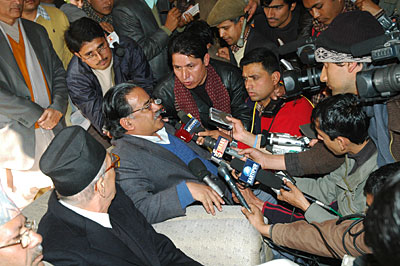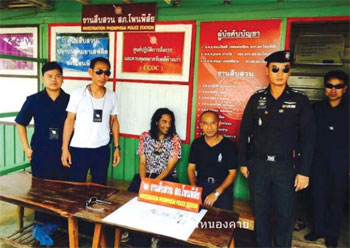Take a break from politics and read books
Originally Published on The Kathmandu Post | Last Thursday (23 April), the World Book Day was celebrated around the world. Many leading newspapers carried special supplements to mark the occasion. This writer was reading a piece by the British Prime Minister Tony Blair in The Times explaining why books remained so important to him, when the writer started wondering how many books our politicians might have read?
Judging by what they say, how they say it, what they do and the way they do it, it is not difficult to imagine that the majority of them are virtually unread. The stereotype answers to reporters’ questions, lack of imagination and vision, failure to speak correct sentences (communists are slightly better in this regard) and failure to put their thoughts in precise and clear manner are basically the result of lack of reading. Even our prime ministers suffer from such types of deficiencies, let alone other politicians.
Reading books has always been an integral part of the lives of good and great politicians. Vladimir Lenin, Franklin D Roosevelt, Winston Churchill, John F Kennedy, Mao Tse-Tung, Mikhail Gorbachev, Nelson Mandela, just to name a few from this century, were all well-read people. It is said that dictators like Adolf Hitler, Pol Pot and Mao Tse-Tung were right about one thing: the power of books. And it was Roosevelt who said in a message to the Booksellers of America in 1942 that “books are weapons…And…make them weapons for man’s freedom.”
Most of our present breed of politicians have become leaders not by virtue of their qualities as a leader, but because they had one common redeeming feature: their persistent struggle against the Panchayat regime. Those were the days when they had plenty of time to read either in jail or out of it. But they did not seem to have bothered to ponder then that if they succeeded in their struggle, they had to lead a nation and for that they needed to equip themselves intellectually. A few who read limited themselves mainly to stuff like Bhagavat Geeta and J Krishnamurthy. The communists were happy to wall themselves up within the boundaries of Marx, Engels, Mao and Lenin. Now in the higher reaches of politics, neither the study of Bhagavat Geeta, nor Krishnamurthy nor the parroting of Marxism and Leninism seem to have been of enough help for them.
They also failed to foresee occasions where they would be negotiating for the nation at bilateral, regional and international levels; that they would be responsible for policies affecting the whole country and they would be the ones who would make or break the fate of their people. Looking at their conduct and capabilities, it is difficult to say that they will be able to argue the nation’s case forcefully and their representation will enhance the nation’s standing. It is sad to note that after more than 50 years of struggle, which was punctuated by a brief stint of freedom nearly 40 years ago, the leaders accepted that they were not “mentally prepared” to hold the reins of power when they were handed over to them. In all those years, had they spent some time in reading (history, politics, biographies, auto-biographies etc.) they would probably have made a better start given the peaceful and patient nature of the Nepalese people.
Consequently, when they came to govern, they had no proper understanding of the country’s situation, had no clear notion about the things they wanted to do and they completely failed to feel the pulse of the nation. They knew virtually nothing except a few cliches: “consolidate democracy”, “get the economy back on track”, “stop corruption” and “improve law and order situation”. Each prime minister after assuming office has been making the same promises. However, all of their promises have been showing a persistently downward trend. No one seems to have sat and studied policy documents, Planning Commission reports, academic essays and articles in an effort to develop a programme to reverse that situation. The irony is that even after their experience in government they have failed to identify, what could be regarded as their glaring mistakes and weaknesses. Each time they come to power, they come with an empty head, make the usual noises and leave the scene only to return, leaving us poorer while making themselves obscenely rich. They seem to have no regret, no repentance about their direct role in the increasingly deteriorating condition of the people and the nation.
Coming back to the British Prime Minister’s piece in The Times where he writes: “In the evening I read books with my children…On holiday I get the chance to read what I want, which is often political biographies…This Easter I am reading Norman Davies’s history of Europe as well as a book about F. D. Roosevelt sent to me by President Clinton.” The above quote shows that Tony Blair is still a keen reader and his interest in books has not diminished.
Couldn’t our leaders, too, find more time to read? That would certainly make them better at leading instead of plotting to either stay in office or overthrow the existing government. The mention of the British Prime Minister’s reading habits is not an attempt to compare British politicians with their contemporaries in Nepal. However, there can be no doubt that if Nepalese leaders have any desire to lead the nation towards the right direction and be remembered by posterity for their contribution, they need to learn a great deal more. And that learning, again, is only possible through reading.
You can read more of Mishra’s column-essays on his three books, Raajnitisangai Raajkaaj, Khana Pugos Dina Pugos and Bhumadhyarekha. Please go to the BOOKS section to find out more about the books and where to purchase them.



